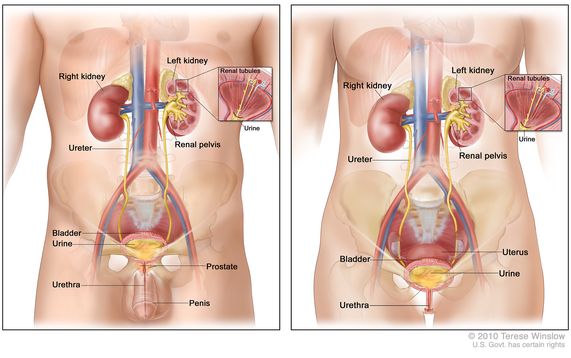Kidney Stones vs UTI: Important Info on Treatment Choices and Prevention
Kidney Stones vs UTI: Important Info on Treatment Choices and Prevention
Blog Article
Discovering the Effects and Causes of Kidney Stones in Comparison to Urinary Tract Infections: A Comprehensive Guide
The exploration of kidney rocks and urinary system infections (UTIs) reveals a complicated interplay of symptoms and underlying causes that warrant mindful examination. What are the key distinctions in their signs and symptoms, and just how might these inform therapy methods?
Summary of Kidney Stones
Kidney rocks, likewise understood as renal calculi, type when particular substances in the urine crystallize and accumulation, resulting in the growth of hard down payments within the kidneys. These rocks can vary in size, ranging from a grain of sand to a golf sphere, and can be made up of different products, the most common being calcium oxalate, uric acid, struvite, and cystine. The development of kidney rocks is affected by a number of aspects, including dietary habits, fluid intake, and genetic tendency.
Signs and symptoms of kidney stones may include serious pain in the back or side, blood in the urine, nausea, and constant peeing, especially as the stone relocates via the urinary tract. Diagnosis commonly includes imaging researches such as ultrasound or CT scans, alongside urinalysis to determine the rock's structure.
Treatment options differ based upon the size and type of rock, in addition to the extent of signs and symptoms (Kidney Stones vs UTI). Little stones may pass naturally with enhanced liquid consumption, while larger stones might need medical interventions such as lithotripsy or surgical elimination. Understanding the pathophysiology and risk variables related to kidney rocks is crucial for reliable avoidance and administration
Introduction of Urinary System System Infections
Urinary system tract infections (UTIs) prevail bacterial infections that impact any part of the urinary system, consisting of the kidneys, ureters, bladder, and urethra. They mainly happen when germs, frequently from the intestinal system, enter the urinary system, leading to swelling and infection. UTIs are classified into 2 major kinds: complex and straightforward. Uncomplicated UTIs typically take place in healthy and balanced people with typical urinary system tracts, while difficult UTIs might develop in individuals with underlying conditions, such as structural abnormalities or compromised body immune systems.
The prevalence of UTIs is especially greater in females than males, largely as a result of physiological distinctions, such as a shorter urethra. Risk elements include sexual activity, certain contraceptive techniques, urinary retention, and dehydration. The diagnosis of UTIs is normally verified through pee examinations, which might reveal the presence of bacteria, white blood cells, or red blood cells.

Signs And Symptoms of Kidney Stones
The pain related to kidney rocks can show up in numerous methods, commonly leading people to seek clinical focus. One of the most usual signs is severe discomfort, usually local in the lower back or side, which might radiate to the abdomen or groin. This discomfort, often referred to as sharp or cramping, can occur instantly and may vary in intensity.
Furthermore, people might experience hematuria, or blood in the urine, which can vary from tiny total up to visible staining. This signs and symptom might be accompanied by modifications in urinary routines, such as increased regularity or necessity, along with discomfort throughout urination. Queasiness and vomiting are likewise prevalent, typically arising from the body's response to extreme pain.
In many cases, individuals may experience high temperature and cools, go to this site particularly if a secondary infection develops because of the obstruction triggered by the stones. In general, the mix of severe discomfort, hematuria, transformed urinary patterns, and stomach signs and symptoms can provide considerable insight into the visibility of kidney stones, warranting punctual clinical evaluation and treatment. Comprehending these symptoms is critical for prompt diagnosis and effective administration of the condition.
Signs And Symptoms of Urinary Tract Infections
Infections within the urinary system tract typically present a variety of unique signs that can substantially influence day-to-day life. The most common symptoms include a consistent desire to urinate, typically gone along with by a burning feeling during urination, known as dysuria. People might additionally experience boosted regularity of urination, producing tiny quantities of urine each time.
Other notable symptoms consist of over cast or smelly urine, which might like it suggest the existence of bacteria or pus. Sometimes, urine might show up red or pink due to the visibility of blood, a problem understood as hematuria. Additionally, people might experience pelvic discomfort or stress, which can additionally intensify the feeling of urgency.
Systemic signs and symptoms might also show up, such as high temperature, chills, and exhaustion, particularly if the infection has risen to the kidneys. It is necessary to recognize these signs and symptoms early, as without treatment urinary system infections can bring about a lot more severe difficulties. Kidney Stones vs UTI. Trigger clinical interest is advised when these signs are observed, enabling ideal diagnostic analysis and treatment to relieve discomfort and protect against more health concerns
Sources Of Each Condition
Often, kidney rocks and urinary system infections arise from unique yet sometimes overlapping causes that can influence individuals in different ways. Kidney stones typically develop as a result of metabolic elements, nutritional selections, and genetic tendencies. Raised levels of calcium, oxalate, or uric acid in the pee can bring about stone formation. Dehydration, not enough fluid consumption, and high-sodium diets can intensify these problems, advertising crystallization within the urinary system.

Understanding these distinct reasons is critical for avoidance and treatment. Kidney Stones vs UTI. While lifestyle alterations might reduce the risk of kidney rocks, proper hygiene and prompt therapy of urinary tract infections are important for minimizing their reappearance and associated problems
Final Thought
In recap, kidney stones and urinary system infections present unique signs and symptoms and underlying causes. Kidney rocks are characterized by serious discomfort and metabolic elements, while urinary system infections primarily include microbial infections leading to urinary seriousness and pain.
The expedition of kidney stones and urinary system infections (UTIs) discloses a complex interplay of signs and underlying reasons that require cautious exam.Urinary tract infections (UTIs) are typical microbial infections that influence any kind of part of the urinary system, including the kidneys, ureters, bladder, and urethra.Often, kidney rocks and urinary system system infections arise from distinct yet in some cases overlapping reasons that can influence individuals in a different way.In recap, kidney rocks and urinary system system infections existing distinctive signs and symptoms and underlying causes. Kidney stones are characterized by severe pain and metabolic elements, while urinary tract infections mostly include microbial infections leading to urinary system urgency and pain.
Report this page